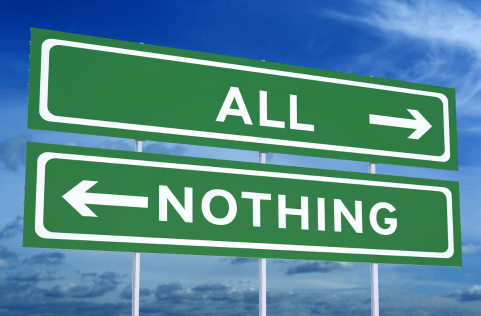We live in a world where all or nothing thinking has become so common. This may stem from a drive for perfectionism or growing up in hustle culture where if you are not “giving it your all” you might as well not try.
In many ways all or nothing thinking has good intentions of wanting to do something well. However, in practice, it really only leaves us feeling ashamed of our performance and negatively impacts our ability to take risks or care for our health.
Let’s chat a little more about what all or nothing thinking is and how it affects us.

what is all or nothing thinking?
All or nothing thinking is a common cognitive distortion that is often linked to negative thinking, anxiety and low mood (1). It is the type of thought process where scenarios are viewed from opposite ends of the spectrum or as either/ors. This type of thinking has been linked to anxiety, depression, substance use disorder, eating disorders, Post-Traumatic Stress Disorder (PTSD), personality disorders (1).
Some examples of all or nothing thinking include:
- “If I don’t get all A’s on my exams then I’m a failure”
- “When I don’t stick to my diet, I quit and binge”
- “I can’t finish everything so I won’t do anything”
- “I always feel terrible, nothing good ever happens”
how can all or nothing thinking be harmful?
Engaging in all or nothing thinking can be harmful to your well-being. Typically, since this type of thinking uses terms of absolutes, it makes it difficult for people to view alternative outcomes. And, in many cases, it makes it feel impossible to see solutions.
This type of thinking can lead to: lower self esteem or confidence, difficulty finding middle grounds of solutions, being less likely to take risks, inability or difficulty forgiving oneself, trouble asking for help, lack of resilience and self compassion (2).

how does all or nothing thinking show up in diet culture?
Although all or nothing thinking impacts people in all areas of life we are going to focus mostly on our bread and butter - food, diet culture and body image. And, trust us, this type of thinking is all too common in our diet culture world. Again, when thinking about dieting, it normally comes in the form of absolutes, such as:
- “Eating this way is the only way to be healthy”
- “I can never have ‘unhealthy’ foods or else I am cheating”
- “I am bad if I have ‘bad foods’”
All or nothing thinking about dieting leaves you to believe that you can only eat a certain way in order to be healthy or “good”. It often leads to restricting during the weekdays and binge eating on the weekends on foods that you have been limiting yourself. Or engaging in yo-yo dieting (and typically weight cycling) due to feeling like you “failed” one diet but will “succeed” with another set of rules.
However, when you look at big picture health, it is so much more about all of the ways we are taking care of ourselves and what we are adding in versus being strict, restrictive and punitive to ourselves. And, in reality, the all or nothing thinking is the thing keeping you stuck in an unhealthy cycle of behaviors. Research shows that people who eat intuitively have improved health markers and outcomes versus chronic dieters (3).
Intuitive Eating helps us to challenge the all or nothing thinking when it relates to food and our health. With the principles of challenging the food police AND gentle nutrition we start to see that we can incorporate foods we love AND still care for our health. It does not have to be all or nothing. And, in fact, as we mentioned above, being able to incorporate all foods, without strict rules can actually improve health markers, body image and self esteem.
If you struggle with all or nothing thinking - we hear you. 99% of our clients come into our office with these same thoughts. AND we are here to tell you that, with practice, it does get better. Let’s dive into the ways you can start to challenge the all or nothing thinking in your life!

how to stop all or nothing thinking
recognize the thoughts...and then challenge them
The first step to any type of behavior change is recognition. Being able to notice when these all or nothing thoughts are appearing in your life is a critical step in being able to stop the thoughts.
Let’s practice.
Make a list of how you notice the all or nothing thinking playing a role in your life. Now, let’s work to challenge it! Are these thoughts accurate? Is there wiggle room in this viewpoint? Start to write down your counterpoints to some of these all or nothing thoughts and PRACTICE saying them out loud. The more you practice providing your all or nothing thoughts with another viewpoint - the more likely you are to disrupt the negative cycle. See step #2 below for a specific way to challenge some of your thoughts.
When it comes to thoughts about food specifically, talk with your dietitian! If there is one thing we love to do as a practice it is to dispel nutrition myths (and boy oh boy are there a lot of them)!
In our Intuitive Eating Jumpstart Course we start to chat about the principle of challenging the food police - more on that here.
practice "and" statements
Begin reframing some all or nothing thoughts with those that allow two things to be true at once. This helps to avoid the absolute-nature that all or nothing thinking falls into. An example of this could be:
- Instead of: “Eating this way is the only way I can be healthy”
- Try: “I’ve learned eating this way is the only way to be healthy AND I know that health promoting behaviors look different for everyone.”
By inserting “and” and another statement into the sentence that is either neutral, or provides another opinion, it can take away the definitive power of the all or nothing thought. This, then, helps you to widen your viewpoint from just that thought.
set attainable goals
Many of the times with the dieting roller coaster or binge/restrict cycle, people are engaging in these all or nothing behaviors or thoughts because of intense restriction that is unattainable for YOUR life and needs.
Remember - diet culture is a billion dollar industry that makes money off of failure. It does not care if people succeed in creating healthier habits. In fact, it most likely prefers that you do NOT succeed so you continue to come back time and time again.
Creating real health promoting habits and behaviors takes time. And, it has to start with building a foundation. And adapting the behavior to fit into your everyday life.
So for example - if your goal is trying to incorporate more fruits and vegetables into your daily diet, meet yourself where you’re at.
- How many fruits or vegetables are you now incorporating? Try incorporating 1-2 more that week.
- What types of fruits or vegetables do you enjoy eating? Start there.
- Do you have access to fresh fruits and vegetables? If not, try frozen or canned options.
Being able to meet yourself where you are at and not try to conform to whatever the newest fad is will help you start to create *actual* attainable goals.
If you are struggling with this part of the journey, reach out to our team at NourishRX! We would love to help strategize some of the barriers you may be having to creating health promoting goals.
insert self compassion
Ah… the age old recommendation of “be more compassionate”. And, we get it, it is MUCH easier said than done. However, all or nothing thoughts can significantly impact how you talk to yourself and your own self image.
Self compassion has been shown to be an antidote of shorts. It is an amazing way to improve your self confidence and perception of yourself (4). And, to be honest, self compassion can truly allow us to show up just as we are. Giving ourselves permission to exist and be messy. Not everything needs to be perfect 100% of the time. Welcome to human existence! Many of us are just doing our best.
If you are interested in learning more about self compassion or specific resources, visit Kristin Neff’s website for more.

how Nourishrx can support you
As non-diet dietitians we see everyday how all or nothing thinking can impact our clients and their relationships with food, body, and movement in a profound, negative way. We want you to know that there is another way to show up in the world, without so much pressure or absolutes. If you’re interested in learning more or taking steps towards improving your all or nothing relationship with food - drop us a line or check out our specialized services.
We are here for you!
References:
Comments Off on How to Stop All or Nothing Thinking